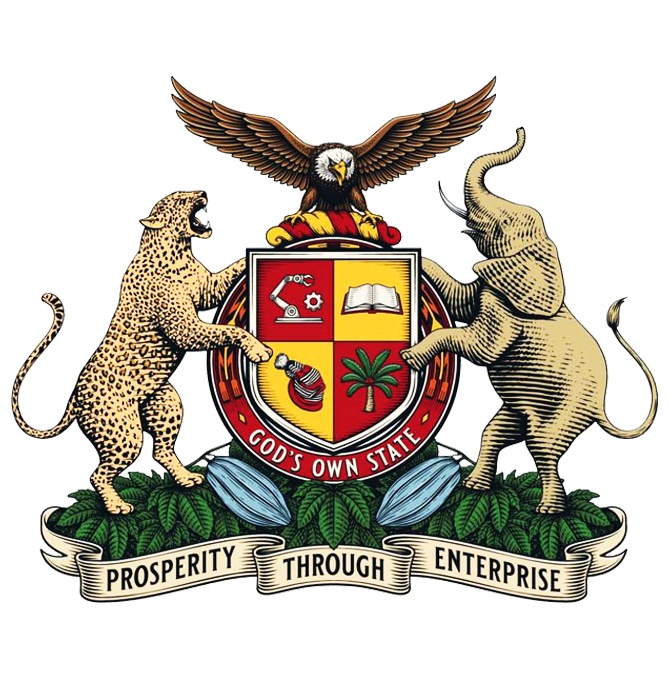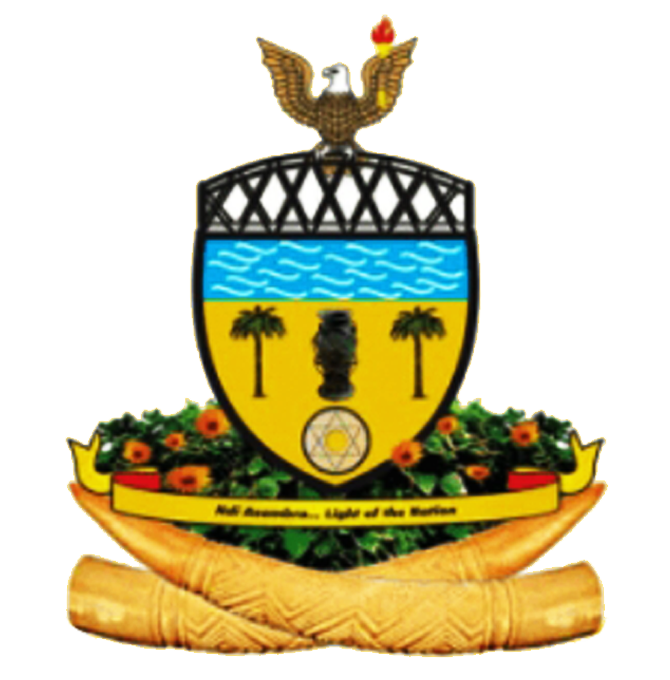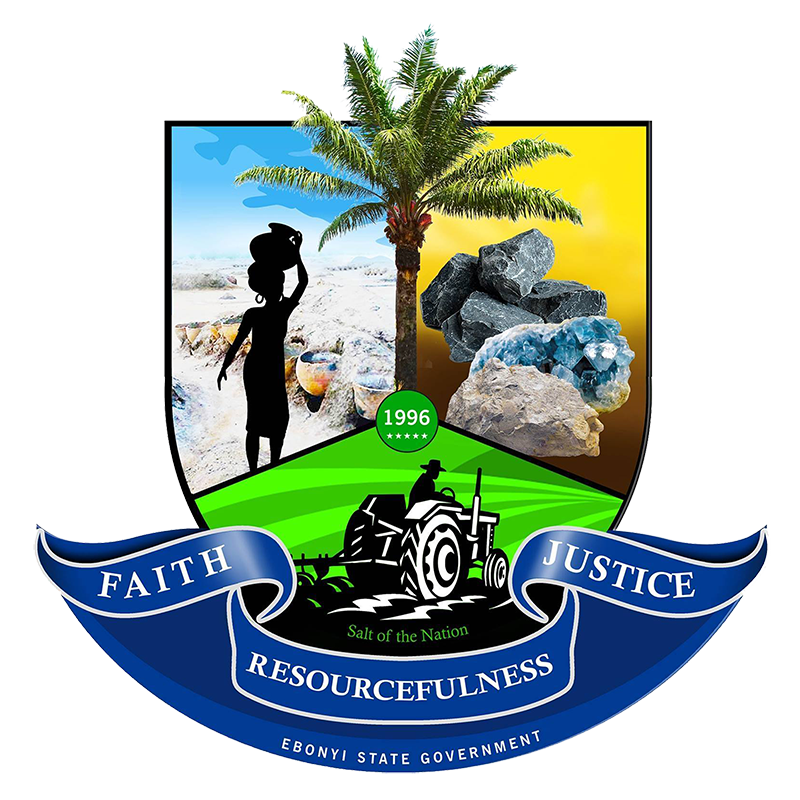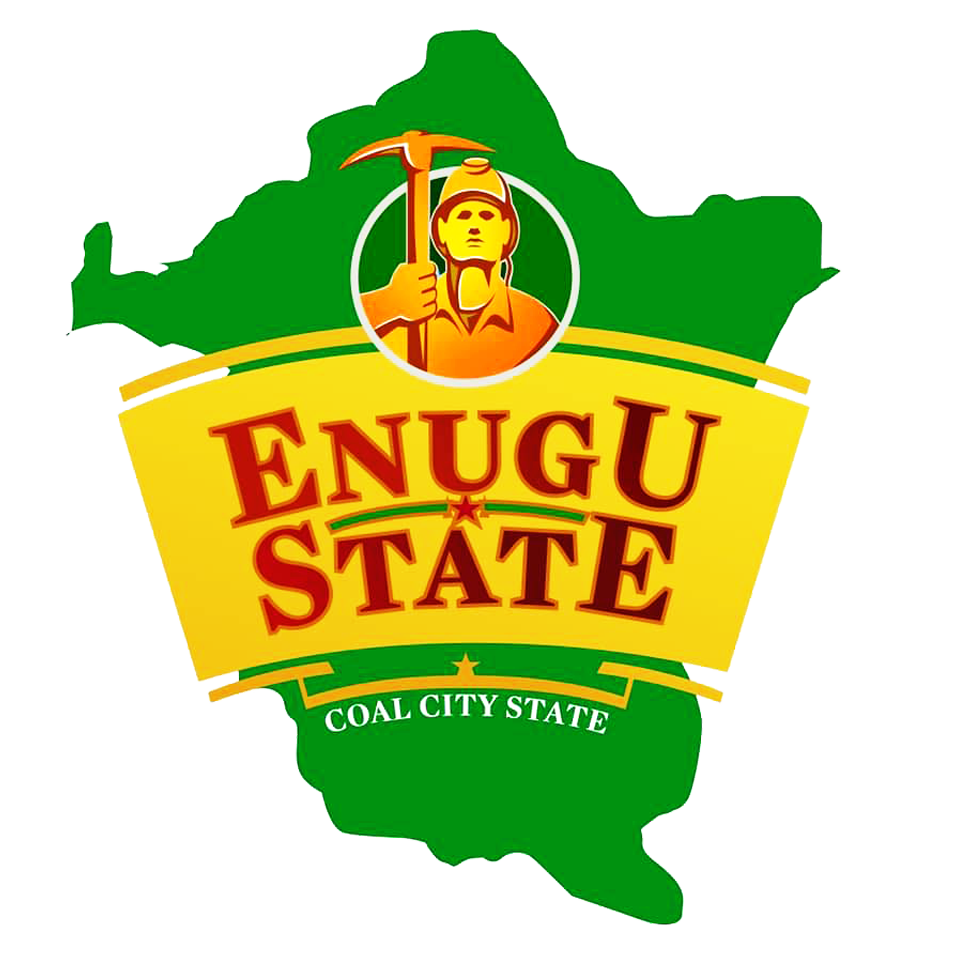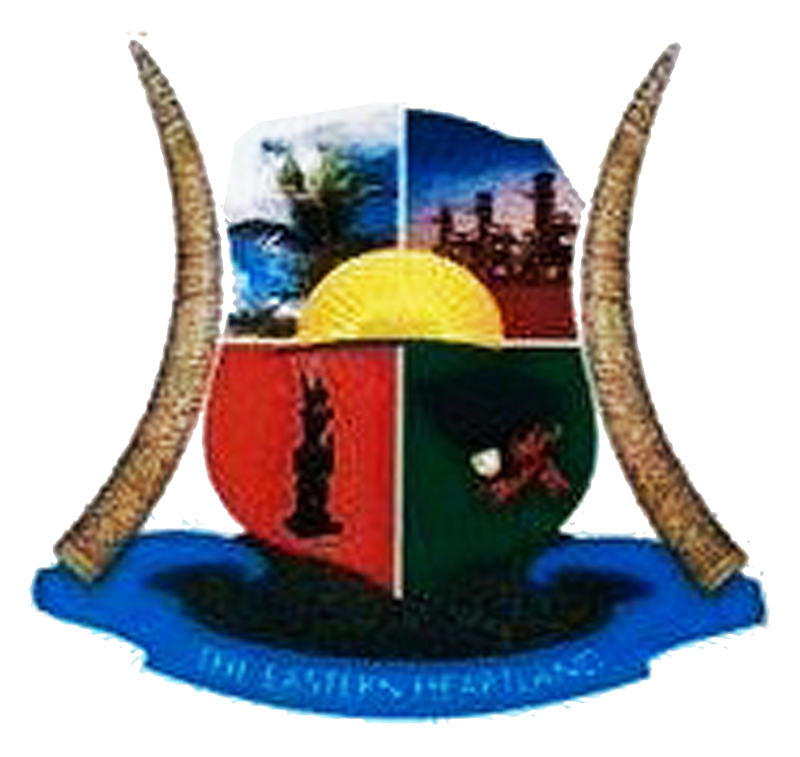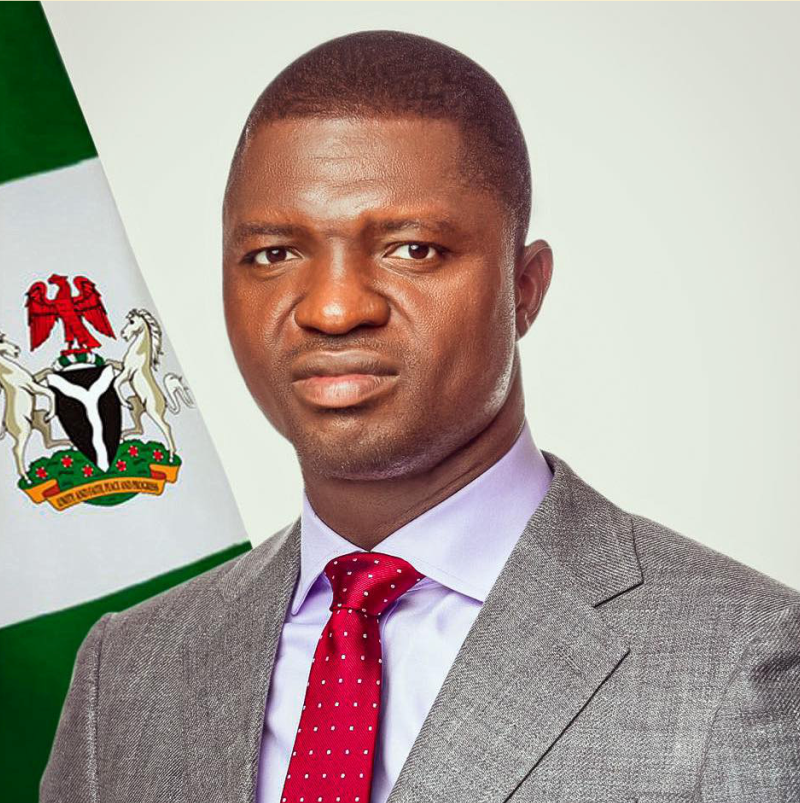
Ebonyi State
Salt of the Nation
Ebonyi State (Igbo: Ȯra Ebonyi) is a state in the South-East geopolitical zone of Nigeria, bordered to the north and northeast by Benue State, Enugu State to the west, Cross River State to the east and southeast, and Abia State to the southwest. Named for the Abonyi (Aboine) River—a large part of which is in the state’s south—Ebonyi State was formed from parts of Abia and Enugu state in 1996 and has its capital in Abakaliki.
One of the smallest states of Nigeria, Ebonyi is the 33rd largest in area and 29th most populous with an estimated population of nearly 2.9 million as of 2016. Geographically, the state is divided between the Cross–Niger transition forests in the far south and the drier Guinean forest–savanna mosaic in the rest of the state. The other important geographical features are the Cross River and its tributary, the River Aloma, which flow along Ebonyi’s southeastern and eastern borders, respectively; while fellow Cross River tributaries, the Abonyi (Aboine), Asu, and Eze Aku rivers run through the state’s interior. There are other smaller rivers like Ichelle and igbe which also form boundaries between Benue and Ebonyi States to the West.
After independence in 1960, the area of now-Ebonyi was a part of the post-independence Eastern Region until 1967 when the region was split and the area became part of the East Central State. Less than two months afterwards, the former Eastern Region attempted to secede in the three-year long Nigerian Civil War with Ebonyi as a part of the secessionist state of Biafra. At the war’s end and the reunification of Nigeria, the East Central State was reformed until 1976 when the state’s north became Anambra State and the south became Imo State. Fifteen years afterwards, Anambra and Imo states were divided with their eastern parts becoming Enugu State and Abia State, respectively. It was not until 1996, when Enugu State’s east and Abia’s northeast were split off and joined to form Ebonyi State.
Economically, Ebonyi State is based around agriculture, mainly of yams, rice, oil palm, and cassava crops. A key minor industry is mining due to lead, zinc, and limestone deposits around Abakaliki, and locally hand-made baskets of various sizes at Ntezi. Ebonyi has the joint-twentieth highest Human Development Index in the country and numerous institutions of tertiary education
Know Your Language
Click Here To Delve Into The Igbo Learning Experience
The Geography
Ebonyi was one of the six states created in 1996 by the then federal military government of General Sani Abacha. Bounded by the states of Benue to the north for about 96 km (partly across the Ichelle and Igbe Rivers), Cross River to the east for 198 km (123 miles, partly across the River Aloma and Cross River), Abia to the south for 70 km (43 miles), and Enugu to the west. The State of Ebonyi was created from parts of both Enugu State and Abia State, which were the Abakaliki division from Enugu State and the Afikpo division from Abia State respectively. It has three senatorial zones, the Abakaliki division make up Ebonyi North and Ebonyi Central senatorial zones, while the Afikpo, Ohaozara, Onicha and Ivo division make up the Ebonyi South senatorial zone. Ebonyi has thirteen local government areas and local development centres created by the state government. It is home to eight prominent higher institutions of learning: Ebonyi State University, Abakaliki (EBSU); Alex Ekwueme Federal University Ndufu Alike Ikwo; Akanu Ibiam Federal Polytechnic, Unwana; Federal College of Agriculture, Ishiagu; Federal College of Education (Technical), Isu; Ebonyi State College of Education Ikwo (EBSCOEI); College of Health Sciences, Ezzamgbo; School of Nursing and Midwifery Mater Misericordiae Hospital, Afikpo; School of Nursing and Midwifery Alex Ekwueme Federal University Teaching Hospital, Abakaliki and Ebonyi State College of Health and Midwifery (EBSCONMU), Uburu. In 2021, three other Universities were introduced by Governor David Umahi, Aeronautical Engineering and that of Technology in Ezza and Izzi Local Government Areas (LGA), and King David University of Medical Science, Uburu, Ohaozara LGA, Ebonyi State.
In 1999, Dr. Sam Ominyi Egwu was elected as the first governor of the state under the People’s Democratic Party (PDP). He was succeeded by Martin Elechi who was elected in 2007 and successfully ran for re-election in 2011, under the same PDP. Gov Martin Elechi was succeeded by the current Governor, Dave Umahi, who was elected in the March 2015 election and re-elected in March 2019 for a second term in office.
Igbo language is the primary language and there is Korring language spoken by the Orring people of Ebonyi state who are also found in their numbers in northern Cross River state who are known as Ukelle people, and the Ufia and the Ogballa people found in Ado and Oju LGAs of Benue state. There are primarily eleven Igbo dialects spoken in Ebonyi states.They are:Afikpo, Mgbo, Izzi, Ezaa, Edda, Ikwo, Kukele, Legbo, ohofia-agba, Mbembe,Okposi,Uburu. Languages of Ebonyi State listed by LGA:
LGALanguages
Abakaliki Igbo [Izzi]
Afikpo North Igbo [Afikpo]
Afikpo South Igbo [Afikpo]
Ebonyi Igbo [Izii]
Ezza North Igbo [ Ezza ], Orring
Ezza South Igbo [Ezza]
Ikwo Igbo [ Ikwo ],
Ishielu Igbo [Igbo-esa], Orring
Ivo Igbo [Ishiagu]
Izzi Igbo [Izii]
Ohaukwu Igbo [Ezza], Orring, Igbo [ Mgbolizhia ]
Ohaozara Igbo [Ohaozara]
Onicha Igbo [Ohaozara]
There are several Igbo dialects spoken in Ebonyi State which includes Edda, Ehugbo (Afikpo), Izzi-Ezza-Mgbo-Ikwo dialect cluster, Oshiri, Unwara, Akpoha, Okposi, Amasiri, Onicha; and a mixed Igbo and Kogi dialects spoken in Amuda-Okpolo, Ntezi-Okpoto and Effium, which is also similar to Kukele in Cross River,[citation needed] and Utonkon in Benue States respectively.
Ebonyi State consists of thirteen (13) Local Government Areas. They are:
- Abakaliki
- Afikpo North
- Afikpo South (Edda)
- Ebonyi
- Ezza North
- Ezza South
- Ikwo
- Ishielu
- Ivo
- Izzi
- Ohaozara
- Ohaukwu
- Onicha
The State government is led by a democratically elected governor who works closely with members of the state’s house of assembly. The Capital city of the state is Abakaliki.
Electoral system
The electoral system of each state is selected using a modified two-round system. To be elected in the first round, a candidate must receive the plurality of the vote and over 25% of the vote in at least two -third of the State local government Areas. If no candidate passes threshold, a second round will be held between the top candidate and the next candidate to have received a plurality of votes in the highest number of local government Areas.
Ebonyi is primarily an agricultural region. It is a leading producer of rice, yam, potatoes, maize, beans, and cassava, and have a notable basket market in Nigeria. Rice is predominantly cultivated in Ikwo, yams in Izzi, with other regions in the state such as Amasiri, Edda and Ezillo making notable contributions, Effium and Ezzamgo taking the top spots in cassava production, and basket production in Ntezi. Ebonyi has several solid mineral resources, including lead, crude oil, and natural gas, but few large-scale commercial mining mines. The state government has, however, given some incentives to investors in the agro-allied sector to encourage production but capacity remains largely under utilized. Ebonyi is called “the salt of the nation” for its huge salt deposit at the Okposi and Uburu Salt Lakes. There are also some tourist locations within the state prominent ones include Abakaliki Green Lake, Uburu Salt Lake, Unwana and Ikwo Beaches.
Ebonyi State University, Abakaliki
A list of tertiary institutions in Ebonyi state includes:
- Akanu Ibiam Federal Polytechnic
- Federal College of Agriculture, Ishiagu
- Ebonyi state University
- Federal University Ndufu Alike Ikwo
- Ebonyi State College of Health and Midwifery, Uburu
- Federal College of Education (Technical), Isu
- King David College of Medicine, Uburu, Ebonyi State
- College of Nursing and Midwifery Mater Misericordiae Hospital, Afikpo
- School of Nursing and Midwifery Alex Ekwueme Federal University Teaching Hospital, Abakaliki
- Ebonyi State College of Education, Ikwo
Ebonyi has the Ebonyi State International Airport, built on the Abakaliki end of the Abakaliki-Afikpo Expressway. Ebonyi has 23 flyovers, the highest in South East Nigeria. Ebonyi state is known for its trademark concrete roads and multicolored infrastructure, began by former governor Dave Umahi.
Ebonyi State are predominantly Christians.
Church
The Catholic Diocese of Abakaliki (1973) with 174 parishes is under Bishop Peter Nworie Chukwu (2021). The Anglican Province of Enugu includes the Dioceses of Abakaliki led by Bishop Monday Nkwoagu, Anglican Diocese of Abakaliki Afikpo led by Bishop Paul Udogu (2010), Anglican Diocese of Afikpo Ikwo led by Bishop Kenneth C. Ifemene, Anglican Diocese of Ikwo and Ngbo led by Bishop Godwin A Awoke (2018) Anglican Diocese of Ngbo.
Ebonyi State has a humid tropical climate, with one rainy season and one dry season lasting for 8 and 4 months, respectively. The temperature typically ranges from 20 to 38 degrees Celsius during the dry season and from 16 to 28 degrees Celsius during the rainy season. Harmattan winds are common between December and January. The average annual temperature is 28 degrees Celsius, and the average annual humidity is 50-60%. The region receives an average annual precipitation of 2500mm.
- Anyim Pius Anyim
- Uche Azikiwe
- Andy Chukwu
- Onyebuchi Chukwu
- Martin Elechi
- Akanu Ibiam
- Chigozie Ogbu
- Frank Ogbuewu
- Ogbonnaya Onu
- Emmanuel Onwe
- Nnenna Oti
- Patoranking
- Sinach
- Tekno
- Dave Umahi
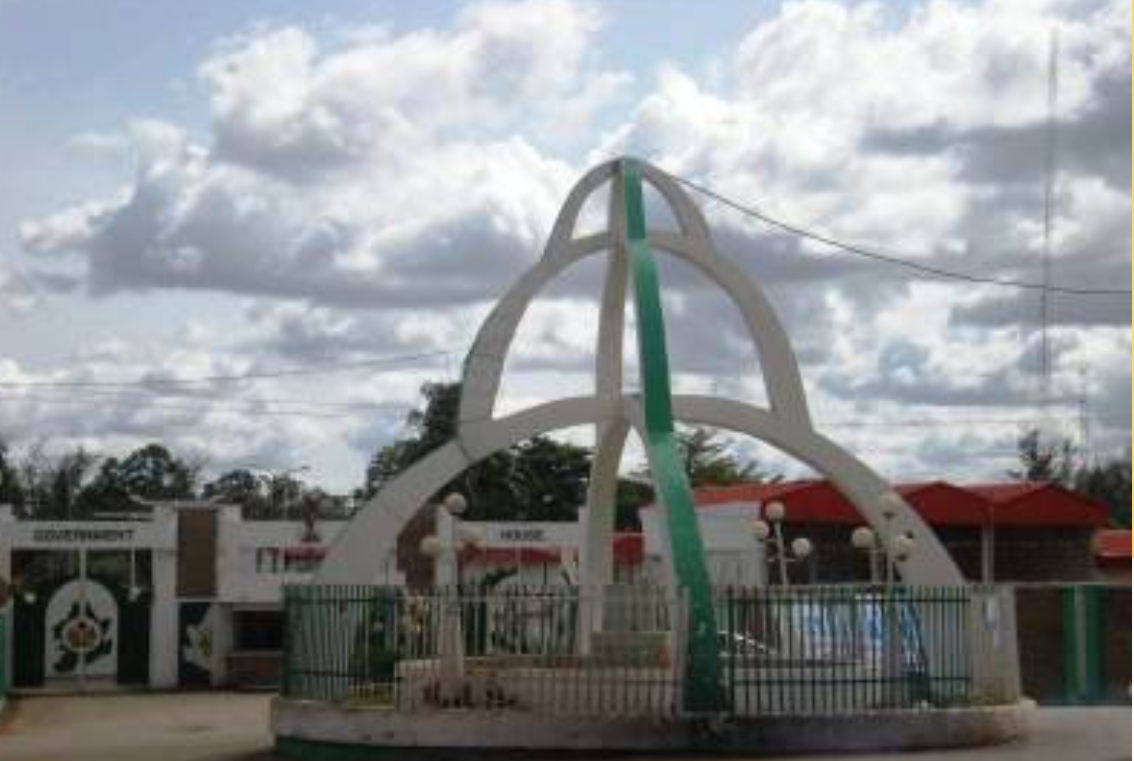
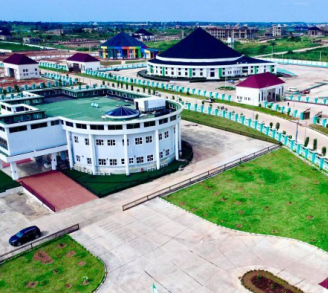
Welcome To Orient Igbo CommunityIgbo Entrepreneurs Igbo Professionals Resourceful Minds
Welcome to our social re-engineering and nationalist platform, dedicated to networking innovative Igbo entrepreneurs, professionals, and politically conscious men and women. Our goal is to build a powerful and influential political and business empire, with significant investments in strategic sectors of the Nigerian economy and polity. Through this initiative, we aim to develop the Igbo community to competes effectively with other tribes and ethnic groups without resorting to violence or any other socially unacceptable methods.
OUR MISSION
To harness the potential of young professionals and entrepreneurs from the southeastern states in fostering unity and development within the society. And to build the Igbo nation into a world tourism hub through the conscious revival and promotion of the rich cultural heritage of the Igbo people of South eastern Nigeria.
OUR VISION
To be a catalyst of development and economic prosperity across the southeastern states, to foster national unity while working as the most powerful platform for the socio-political emancipation and empowerment of Igbos anywhere in the World by building a powerful network of innovative Igbo professionals and entrepreneurs for the overall interest of the Igbo ethnic nation.
OUR VALUE
O-Originality
R -Resourceful
I -integrity
E-Excellence
N-Networking
T- Team Work
The Southeastern State; We are the MerchantCreativeIndustrious Tribe of the Nation
The South East (often written as South-East) is one of the six geopolitical zones of Nigeria representing both a geographic and political region of the country’s inland southeast. It comprises five states – Abia, Anambra, Ebonyi, Enugu, and Imo.

